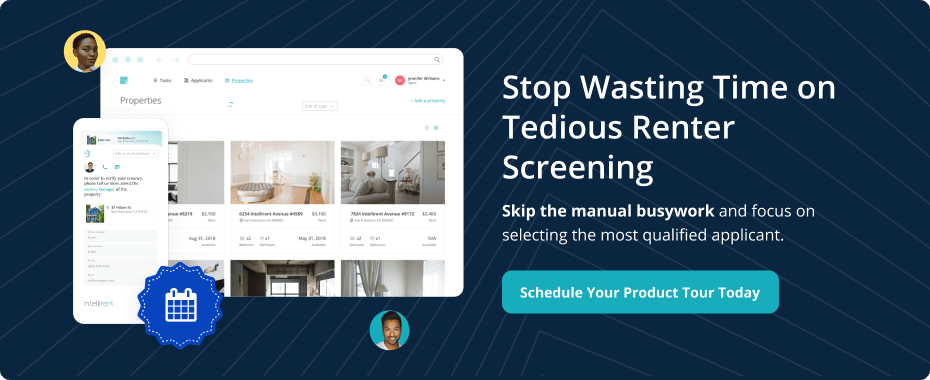July 18, 2023 • 6 min read

True or false: Is an applicant who doesn’t meet the financial criteria for your open property automatically a poor fit for a renter?
Though this question is sometimes true, this traditional leasing view of things doesn’t capture the full picture. For example, a renter who does not meet your on-paper requirements–like a famous actor without a steady income, for example–might still be the perfect renter for your open unit. You want them, but you can’t change your criteria for one renter. And a guarantor application comes into play. But how do you know when to use a guarantor application?
This post will cover the basics of guarantor applications. We will also provide five examples of situations when you may accept a guarantor application for one of your available properties.
What is a Guarantor Application?
Before we dig into our examples of when a guarantor application might be the best option, let’s first establish what a guarantor application is.
You can use a guarantor application if a potential renter does not meet some of your rental criteria, such as income requirements.Requesting that a guarantor complete an application offers an additional layer of protection that allows property owners to consider applicants who may not alone meet all requirements in the standard criteria for a property.
This application offers an additional layer of protection that allows property owners to consider applicants who may need to meet the standard criteria for their property.
Requiring a guarantor application allows property managers to ensure they receive timely rent payments and have a safeguard in place if the renter cannot meet their financial obligations. It acts as an insurance policy, providing peace of mind to property managers if the primary applicant faces difficulties fulfilling their responsibilities. This way, property managers can mitigate risks and protect their interests while still renting the property to the applicant.
What Information is Included on a Guarantor Application?
The guarantor application should include fields similar to your standard rental application.
Typically, a guarantor application will request personal information like income, employment data, and references for the guarantor who is assuring the rent for the applicant.
Some guarantor data you will want to collect includes guarantor income and credit history.
What Are the Benefits of Using a Guarantor Application?
Property managers can enjoy several benefits when allowing or requesting a guarantor application. Let’s take a look at a few of them:
- Renter accountability: Establish accountability for your renters using this type of application. The presence of a guarantor motivates renters to fulfill their obligations, as they know their actions can impact not only their rental history but also that of their guarantor. This increased accountability can contribute to more responsible behavior and a greater likelihood of timely rent payments.
- Lower risk for property managers: A Guarantor Application provides legal protection for property managers. Property managers can reduce the risk of discrimination claims by allowing lower-income renters to apply for their properties with a guarantor attached. Furthermore, in the event of payment delinquency or damage caused by the renter, the guarantor can be held responsible, helping property managers recover potential losses.
- Widening the pool of potential renters: Some individuals may need to meet the income requirements necessary to rent a property independently. By accepting a Guarantor Application, property managers can offer an opportunity to these individuals, expanding the pool of potential renters. This approach ensures equal opportunity for all prospective renters, irrespective of their financial circumstances, as long as they have a suitable guarantor.
Related Read: The Ultimate Guide to Tenant Screening: Steps, Tips, and Tools
A guarantor application is a tool property managers use to minimize risks and protect their interests. It holds renters accountable, lowers risk for property managers, and broadens the pool of potential renters by allowing individuals who may not meet the standard criteria to secure a rental property with the support of a guarantor. Implementing this application process can help you foster a more secure and inclusive rental environment with your properties.
When to Use a Guarantor Application: 4 Examples
1. Insufficient or Inconsistent Income
The first situation in which you may choose to use a guarantor application is if you are faced with an applicant whose income needs to be higher or more consistent to meet your usual application criteria.
You can get added assurance that, despite these income discrepancies, the applicant will pay rent and other expenses on time when a guarantor co-signs the lease. In this instance, a guarantor application is a win-win situation as it enables renters who might not meet the income criteria on their own to secure a rental property. In addition, the property manager benefits from having a reliable payment source, reducing the risk of late or missed payments.
However, there are risks involved with bringing on a renter with insufficient income, even with a guarantor on board. So, it's important for property managers to thoroughly assess the guarantor's financial situation and creditworthiness to ensure they can fulfill their obligations if the renter cannot pay.
2. Lack of Credit History
A poor credit score is often an automatic dealbreaker in a rental application. However, a guarantor application can be a valuable solution if an applicant’s score is poor simply because they have little to no credit history.
Related Read: 4 Essential Tenant Screening Questions To Ask Every Applicant
Property managers may request a guarantor with a better credit history willing to co-sign the lease. You can rest easy knowing that, even if the renter builds poor credit with their blank slate, your business is secure, and you’ll still get your payments on time from the guarantor.
The guarantor's positive credit history can reduce the risk of delinquency for renters with little to no credit. However, property managers must conduct thorough due diligence on the guarantor's creditworthiness to ensure they can meet those obligations.
3. Lack of Rental History
Similar to the applicants with a lack of credit history, you may receive applications from first-time renters. However, with no rental history, how can you be sure they will respect your property, pay on time, and be a strong renter?
Requesting a guarantor who can vouch for the newbie renter’s reliability and financial stability can help to reassure you and protect your interests. In this case, the guarantor doubles as a reference, confirming the renter’s ability to pay and manage the property appropriately.
However, property managers should still exercise caution and carefully evaluate the guarantor's qualifications and credibility to ensure they are a reliable and suitable backup. After all, if their referral doesn’t pan out, you will need to be able to collect your funds from the guarantor instead.
4. International Renters
The last example we’ll discuss in this post is international renters. Suppose you are considering renting your property to a student or another individual without a U.S. credit history or rental history. In that case, a guarantor application might be just what you need to put your mind at ease.
Related Read: International Tenant Screening Service: Tips, Tools, & Best Practices
Property managers may require a guarantor who is a U.S. citizen or resident with a good credit history. This ensures that a financially responsible party can intervene if the renter faces difficulties. The benefits for property managers include expanding their potential applicant pool and reducing the risk associated with renting to individuals without a local credit or rental history. However, as with all cases, you must exercise caution and take the proper time and steps to verify the guarantor’s credit and finances.
Pro-Tip: Some property management platforms, like Intellirent, offer integration with services like NOVA Credit, which allows international renters to provide alternative credit data for evaluation.
Guarantor Applications, Tenancy Verifications, and More
Considering these examples can help you determine when to use a guarantor application for your leasing applicants. However, guarantor applications are only one piece of your application approval process puzzle.
To simplify and streamline your entire application and approval process, you need a robust tool capable of helping with background checks, tenancy verifications, collaboration and communication, and more.
Intellirent offers all of this functionality and more. Our tool not only helps streamline your application process but helps you get more applicants by helping you create attractive listings in minutes.
Take a product tour today to see if Intellirent is the solution you’ve been waiting for!
Published by Eric Hurst
July 18, 2023
Related Articles
August 01, 2023 • 6 min read
August 22, 2023 • 5 min read
Subscribe For Insights
Get actionable leasing tips, tools, and best practices directly to your inbox. Don't miss out on the insights that'll help your team confidently find, screen, and approve the most qualified renters.


